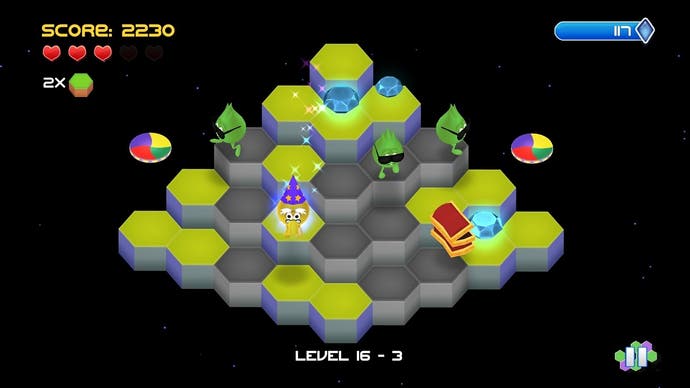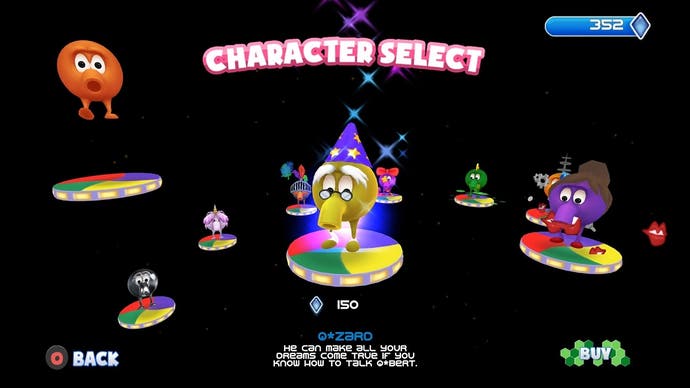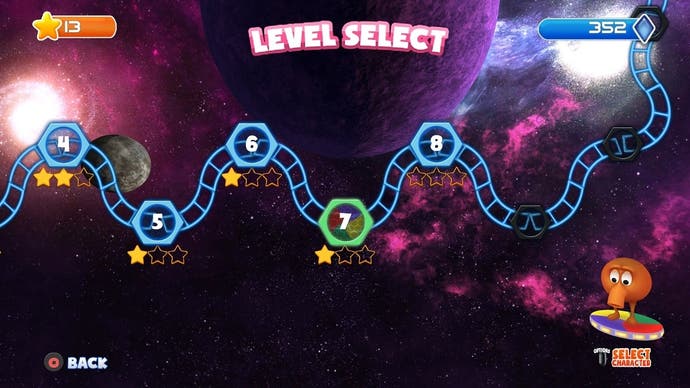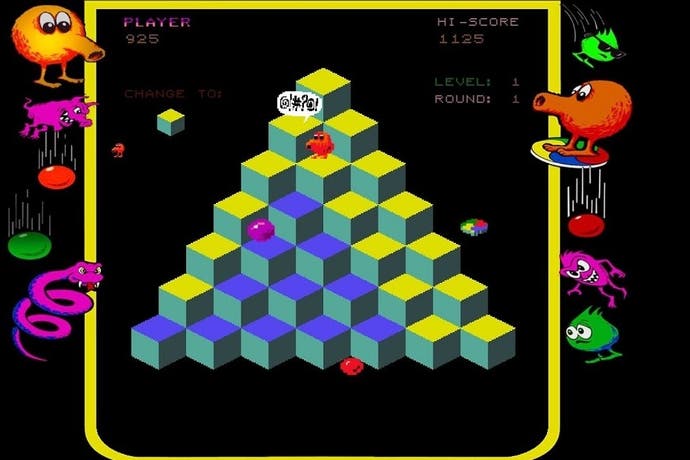Q*Bert Rebooted review
“@!#?@!”
Eurogamer has dropped review scores and replaced them with a new recommendation system. Read the editor's blog to find out more.
Poor old Q*bert. He may have been a minor celebrity in 1982, but his fame didn't have the staying power of Pac-Man and Space Invaders. In 2015, the hose-nosed squawking orange lump is more of a nostalgic footnote than an actual brand.
Through a series of unlikely corporate takeovers in the early 1980s, when Columbia briefly owned arcade company Gottlieb, the Q*bert character is actually now owned not by a games publisher, but by movie company Sony Pictures. Hence his cameo in Disney's Wreck-It Ralph, and his upcoming appearance in Sony's own arcade-themed CG movie Pixels this Christmas.
And hence this rebooted revival of the original game, which clearly hopes to follow in the feted footsteps of Pac-Man Championship Edition DX and Space Invaders Infinity Gene in revitalising 30 year old game design for modern tastes. Sadly, while the result is pleasant enough, it doesn't have the same ingenuity or inspiration that allowed those updates to expand on the classics.
As with all early arcade games, the core concept is deliciously simple. Viewed in isometric 3D, Q*bert begins each level atop a pyramid of cube platforms. By hopping up and down and across, he changes the colour of every square he touches. Colour in all the squares and you're off to the next stage.

Complications come from a variety of enemies. Red balls drop at the top of the screen and tumble down, pachinko style. There's also a pink snake who bounces relentlessly after Q*bert, and two purple critters who advance up the pyramid, using the vertical sides of the cubes in an Escher-esque way. Finally, there are non-lethal green enemies who will reset the colour of every platform they land on.
Your only real means of defence is avoidance, but should things get too dangerous you can make use of spinning colourful discs at either side of the pyramid. Jump on these and they'll spirit you back to the top and then vanish. With careful timing, you can trick the snake into leaping off the side into the void, clearing the screen of enemies in the process, but of course you can easily suffer the same fate should you fall off the side.
Q*bert Rebooted, first released for PC last year, offers two ways to play. The original arcade game plus, as the title suggests, a new "rebooted" spin on the same gameplay. That means hexagonal platforms rather than cubes, and a new structure which parcels play up into short bursts of three stages, strung along a linear progression path. Obviously created with one eye on mobile - the game was also released on iOS - there doesn't seem to be any reason behind this change other than the fact that everyone else is doing it.

Each batch of stages can be played three times to earn stars - first you simply have to complete the stages, then beat them against the clock, and finally earn a certain number of points. Every now and then you'll bump up against a barrier that requires a certain number of stars to progress. Annoyingly, you can only ever earn one star at a time. So even if you beat a stage in record time and get a high score in one attempt that will only count as the first star. You always have to play three times over to get all the stars, and the goals chosen don't do enough to shake up the way you play to justify the enforced grind.
Visually, the Rebooted mode is blandly efficient. All the expected characters have been enlarged and smoothed out, but doing so reveals them to be a fairly charmless bunch. There's a thick plastic sheen to it, technically superior but sorely lacking the personality that good pixel art creates.
The other addition for Rebooted mode is gems, but don't panic - these aren't the sort of gems that power microtransactions. Instead, you collect them during normal play and grab as many as you can in bonus levels at the end of each level. You can then cash them in to unlock different Q*berts.
There's Q*tee, his little sister, or Q*nicorn, who leaves a rainbow trail. There's a liquid metal one inspired by Terminator 2, and one dressed like a wizard. You get the idea. The cheapest costs 75 gems, with others costing as much as 300, yet since the differences between them are entirely cosmetic and none seem to change the gameplay in any meaningful way, you suspect they're included just because modern games demand that you should have a currency to collect and content to unlock.

It's a timid sort of reboot, then, seemingly driven more by change for change's sake than by any great vision. More problematic is the overly sensitive movement, courtesy of the Sixaxis controller. The analogue precision demanded by a modern joypad is a poor match for the simple robust four-directional inputs demanded by early arcade design. This is particularly noticeable in Rebooted mode, where the difference between, for example, jumping left and jumping up-left is hard to gauge. You'll lose a lot of lives to this slippery movement, as Q*bert hops in the wrong direction and tumbles to his doom.
Also disappointing - and incomprehensible - is the absence of any sort of leaderboard, either local or online. It's not so essential in Rebooted mode, where progression along the path is presumably supposed to be motivation enough, but in the Classic mode it's unthinkable. What is the purpose of an arcade game if not to enter your initials alongside that winning total for everyone to see? The highest score is retained during each play session, but even then there's no way of showing that it's your score.
It's this seemingly minor but actually major omission that really sums up Q*bert Rebooted. It's a recreation of a popular game, but it's been done with no apparent understanding of how classic arcade games earned their audience, or why they proved so damnably addictive. Between a lack of understanding on the Classic side, and an absence of inspiration on Rebooted, it's a perfunctory package that will only really please those looking for the most basic retro entertainment.

